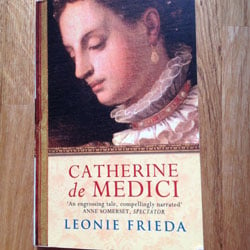Book Review: Catherine de Medici
Posted on
In my review of Alison Weir's "Elizabeth of York", I mentioned that it was a Christmas present. What I should have mentioned was that it was one of several books I received about incredible women in history. My Dad even commented that "all your books have a running theme", which is now a themed shelf on my bookcase.
Leonie Frieda's book "Catherine De Medici" is another book in the same vein as Elizabeth of York. Catherine was a Queen of France as the wife of King Henri II of France, although at the time of their marriage it was his older brother who was due to inherit the throne.
The Life of Catherine De Medici
Catherine's life cannot be described as a particularly happy one. Orphaned within weeks of her birth, her fortunes swung from being the adored relation of a Pope through to hated scion of Florence's foremost family. Caught between the peculiarities of medieval geopolitics, when today's enemy could be tomorrow's friend, she had several potential husbands waiting in the wings until Henri was picked. Their marriage would not be a happy one, her husband was obsessed with his mistress, and it took so long for Catherine to conceive a child that an annulment was considered on the grounds of infertility. Not only that, but her dowry was never paid as the De Medici Pope died a year after the wedding, and his successor refused to pay it.
In the end though, Catherine and Henri had ten children, including several sons. Most of them suffered from poor health and the eldest, Francis, was fifteen when Henri died in a jousting accident. His own death eighteen months later meant that his younger brother, Charles, became king at the age of nine. Catherine effectively became Regent while her son grew up, and continued to give her advice and use her influence in many years to come. She is chiefly remembered for the St Bartholomew Day's Massacre, in which thousands of people, mostly Huguenots, were killed after the wedding of her daughter Margot.
The Book
Leonie Frieda's book covers the whole of Catherine's life, from the tumultuous childhood through to her death and the years that followed. Her evidence  includes Catherine's own letters, which were preserved as her belongings were auctioned off after her death to pay her debts, as well as sources from archives in France and Italy, and earlier scholarly work. She includes family trees, lists of the main historical figures, and maps of France and Italy so you can go back and refer to them if you get mixed up (useful for me as I kept forgetting where La Rochelle is).
includes Catherine's own letters, which were preserved as her belongings were auctioned off after her death to pay her debts, as well as sources from archives in France and Italy, and earlier scholarly work. She includes family trees, lists of the main historical figures, and maps of France and Italy so you can go back and refer to them if you get mixed up (useful for me as I kept forgetting where La Rochelle is).
The best thing about this book is that Frieda manages to make an excellent balance between discussing Catherine's life and explaining the actions of the men that were around her. Many books about women get very caught up in explaining the male side of things, and then return to explain the effect it had on the woman they're writing about. With this there was no point when I felt that Catherine was being forgotten in favour of her husband or sons. Her relationships with all her children are brought in and explained at various points, along with her various alliances and suspicions about France's other noble families. Since I know very little about French history, I found her explanations about the various Wars of Religion very informative, without being too confusing.
If there is one fault with this book, it's the lack of pictures. Catherine's lack of beauty is mentioned several times, but with no pictures to refer to it's difficult to work out how she looked. The same can be said for some of the surviving buildings in Paris that were built in her time, while many were remodelled by later Kings, if there were any surviving floor plans or etchings, they would have been nice to see to add a bit of context.
Pictures though is a very small point, even without them this book is still an excellent read. I would really recommend it for anyone that wants to learn more about Catherine, or just a well-known woman in history.